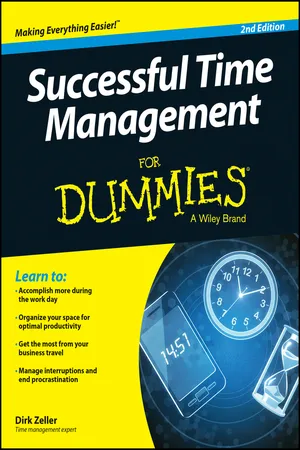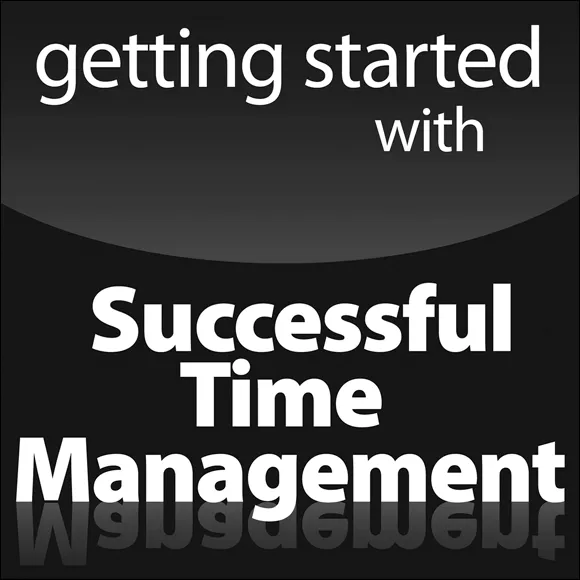In This Chapter
Understanding advance planning
Realizing 1,000 percent return
Assembling everything you need
Learning the three keys to personal organization
Stepping back to evaluate
Time management boils down to a mindset of focusing on your priorities, goals, and objectives for a specific time period — a week, a day, or even an hour. It’s the awareness that you are the one who lays claim to your success with the allotment of time you have for today.
Time management is a set of skills that are learned over time. The skills taught in this book — for example, of time blocking, single handling, controlling interruptions, and others — don’t provide you with overnight success, nor can you implement or perfect them quickly. They require patience to fail, adjust, proceed, and then repeat the process many times. But by sticking with it, you can accomplish what needs to be done without too much stress and panic, and maybe have a little extra time left over.
This book is about taking control of the time you have in each day. Effective time management requires a little introspection, some good habits and organizational skills, and a handful of logistical and tactical tools. So take some time and get ready to learn how to manage it successfully.
Planning in Advance
The planning process for a project, your workday, or even a vacation is more vexing than the execution. Many people invest countless hours planning that perfect vacation to Hawaii. They research the different island options, review recreation activities, lodging, air travel, dining options, the list is endless. But few people plan their day or week with such zeal.
You have to fall in love with advance planning. You are likely faced each day with tasks you would rather not do, but frequently they seem to be high priorities. For example, most salespeople don’t wake up each morning saying, “How exciting today; I get to call people I don’t know and ask for their business!” Most moms don’t get up and say in an excited tone, “I get to remind my seventh‐grade son ten times to make sure he packs his homework before he goes to school!”
This is where advance planning brings big dividends to your life. Before your day begins — maybe the night before — plan to do the toughest but most important things first. Usually tough tasks become more challenging to complete throughout the day as more projects, deadlines, and emergency items crop up. So a good rule is to clear out the tough tasks first.
The sheer act of planning is the key to unlock your creativity, problem solving, mental strength, and clarity. It also increases your mental and physical energy because you see the pathway to a productive day.
The better you use planning strategies and techniques, the more you can avoid procrastinating away what you don’t want to do. At its base level, planning is simply creating a list. You increase your productivity by more than 25 percent by simply writing down what you need to accomplish. The advantages of creating a list are as follows.
Achieving peace of mind
Create your life as you wind down for the day so that you’re ready to take on tomorrow. You likely are able to rest and relax more, knowing that your following day is planned. You sleep better when you don’t have unresolved issues weighing heavy on your mind. You won’t get that middle‐of‐the‐night wake‐up call of “Did I get that done?” You can achieve a deeper slumber by knowing you have your time and tasks under control.
Activating your subconscious mind
You also trigger your subconscious mind while you sleep. Because you have created your list, your subconscious works on that list while you rest. Your subconscious mind turns the challenges and problems over and over like a rotisserie, and eventually it comes up with strategies and solutions. Have you ever gone to bed with a problem or challenge only to wake up with a couple of new ideas on how to solve them? Your subconscious mind created those ideas while you slept. Always give your subconscious something to do at night by . . . handing it a list.
The 1,000 percent return
There is always a large payoff for planning. Many studies have indicated that for every minute of planning you save ten minutes in execution. That is a 1,000 percent return on your time with proper planning. Those numbers don’t really illustrate a return of 1,000 percent; a monetary example can put the proper scope on it.
If you have $10,000 and you got a 1,000 percent return in one year, at the end of the year you would have $100,000. If you receive a 1,000 percent return the next year, you would have $1,000,000. The initial investment went from $10,000 to $1,000,000 in less than two years. That’s the type of return you can receive each day from planning properly.
Frequently the response I hear is, “I am too busy to plan.” I have even tried to use that excuse myself. The truth is that even if you planned out everything in excruciating detail by forcing yourself to do it, you most likely would not invest more than a few minutes a day in the whole planning process. Strange as it may sound, sometimes you may need to slow down in order to speed up. Planning is the only pathway to greater productivity and quality of life.
The wasted time and mistakes you make are most likely related to a lack of planning. The most epic failures have commonality in lack of planning. My single most disastrous business failure came from lack of planning. I rushed into a decision without giving it the thought, planning, research, and care it deserved. It cost me a year of my life and hundreds of thousands of dollars in income. It was an expensive lesson on planning in time and treasure.
Assemble all that is needed
After you have planned out your day, a project, or even dinner, you then need to gather your materials to start and complete the project. I frequently cook with my kids, both Annabelle and Wesley. They get so excited that when we decide which recipe to make together they are instantly ready to crack the eggs and start mixing. I have to slow them down to read the recipe, gather all the ingredients, the measuring cups, pans to bake in, bowls, hand mixer, and so on. I want all of the tools on the counter in an organized fashion for a couple of reasons.
The kids and I might find a trip to the store is necessary for a missing ingredient before we start. That certainly will add time to the project. We could find something else to cook where we have all the ingredients, saving us a trip. We save time by not wandering around the kitchen from pantry to refrigerator to food preparation area. It saves time in cleanup because the mess is concentrated in one area rather than all over the kitchen. By assembling all that is needed, you save considerable time.
Before you start on anything, ask yourself these key questions:
- What data or information would make completing this quicker?
- Is there some information I don’t have that would save me time for this project?
- Do I really have everything I need?
The cycle of planning, to gathering, to implementation is the cycle of success and efficiency. If you have to backtrack to gather resources after you’ve begun implementation, or go back to planning because your execution is stalled, and the waste of your time in the backtracking is a significant loss.
Handle everything — just once
In today’s technology world, you deal with less paper because of electronic documents; even with electronic documents you tend to handle and review them multiple times before acting on them. This review is as if you had paper stacked on your desk; it’s just now in your computer and email inbox. The shuffling and reshuffling just happens inside your computer, so it seems far more efficient. The truth is you can just store more stuff easily so your productivity can really plummet.
If you’re like me, at times you tend to hoard stuff. Because you can store so much in electronic files you tend to keep rather than purge. You can be more efficient with your time if you throw away documents, files, and paper that you don’t need. Anything that is not relevant to your life, family, business, or goals, throw it out. Ask yourself, “Is there a negative consequence to throwing this out now?” If the answer is no, throw it out now.
If you need this information in the future, is there another place you could easily access it? The truth in our society is, information is becoming a commodity. Information is readily available, so keeping it because you might need it in the future only overloads you with files, documents, and stuff.











